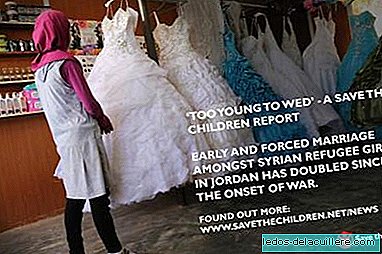
Save the Children has warned that the forced and early marriage of Syrian girls in Jordan, it has doubled since the war began. Extreme poverty and fear of sexual violence in refugee communities makes some parents believe that marrying their daughters is the only option they have.
A quarter of marriages among Syrian refugees registered in Jordan are under 18, according to the United Nations Children's Fund. But before the war, child marriage already represented 13 percent of total marriages, it is a matter of figures: now there are many more, in addition 48 percent of them are married to men at least 10 years older.
Girls who marry before the age of 18 are more likely to experience gender-based violence and have more difficult access to sexual and reproductive health services, which also forces them to take a risk to their health
Save the Children today presents a report based on real cases, detailing the reasons why families opt for early marriage for their daughters. In general, refugees have few resources and economic opportunities, and they feel the need to protect girls against sexual violence; They think that giving them in marriage will improve their economic situation and their daughter's husband will protect her.
However, there are many families that are strongly opposed, they are mostly mothers who want girls to finish their education.
Consequences of early marriages
In addition to the risk to reproductive and sexual health (including that children under 15 are five times more likely to die during childbirth), these girls may suffer mental disorders due to social isolation, stress and abuse. That is why we talk about physical and mental consequences.
further are more likely to leave school to take care of the husband, the house and the children they have.
There are solutions to prevent child marriage, which include providing tools to girls that allow them to increase their self-esteem and make decisions for themselves, support girls and their families financially and with incentives so that they do not resort to these practices, educate and sensitize families and communities, ensure that girls have access to quality education and promote policies and laws that ensure the protection of girls' rights.












